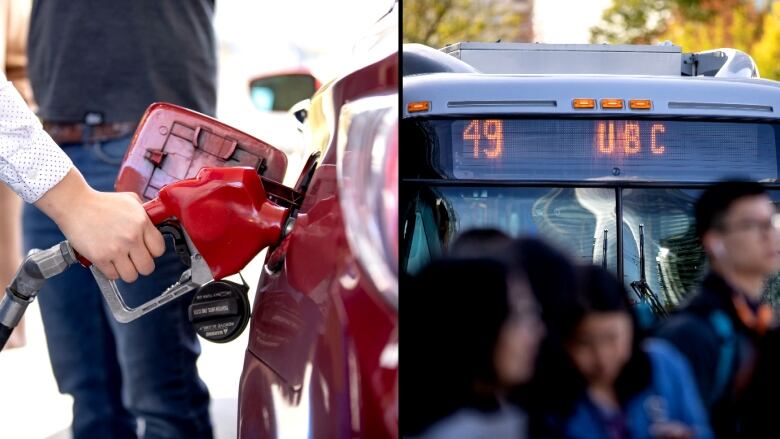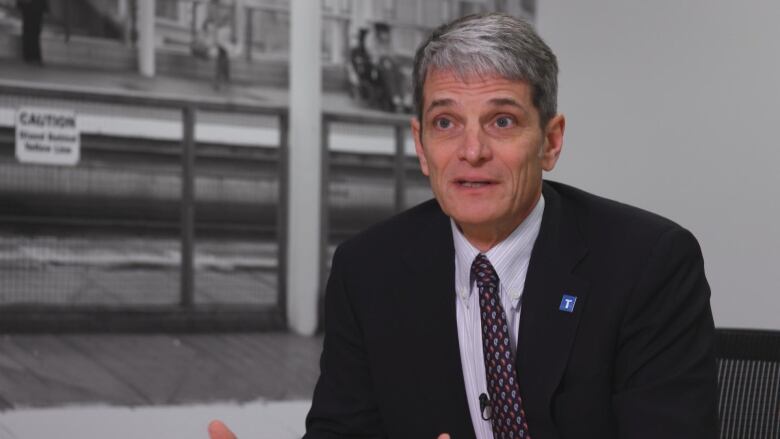Gas prices and transit ridership at record highs in Metro Vancouver and the two are related
Transit is improving and car use is declining, but it's important to be honest about taxation tradeoffs

This week, the two biggest transportation stories in Metro Vancouver were the debateover record-high gas prices, and celebration over record-high ridership figures on public transit.
And yes, the two are related.
"I have so many people coming to tell me thatit's costing them over one hundred dollars to fill their car tank gas tank, and making other choices," said Adriane Carr, chair of Metro Vancouver's climate action committee.
At a time when many public transportation systems in North America are lagging, the story of why more and more trips are being taken on TransLink437 million of them last year to be exact, up from 407 million in 2017is a complex one.
But one of the factors is pretty straightforward: high gas prices,owing in part to fuel taxes that are higher in Metro Vancouver than anywhere else in Canada, are changing behaviour.
Or as Carr says, "as you make things more expensive, the hope is what you're going to do is drive down the use of that."
Behavioural economics 101
As a rule, politicians don't like to be explicit about using taxation to change behaviour, but it happens all the time.
"There's a brand of political theory ...called libertarian nudging," said political scientist David Moscrop.
"They don't take away your freedom. They just incentivize different choices."
It's a pretty clear relationship: The tax on fuel in Metro Vancouver has an additional surcharge that goes toTransLink, and has increased from 12 cents/litrein 2009 to 18.5 cents, as of July 1.
That allows TransLInkto build several rapid transit linesand expand the bus network.
Which in turn meansmore people decide to use the system andpart of the reason whyis that the cost of driving has reached a breaking point for some.
"When you see a change in relative prices between driving a car and taking transit, you'll see people adjusting," saidUniversity of British Columbia economistWerner Antweiler.
"And so that's precisely what people are doing."
Good newsfor most
It bears emphasizing that improved transit is a welcome thingfor most people, whether because of price, convenience, the effect on carbon emissions, or how it increases mobility for those that can't afford their own cars.
Which is why critics of the government's approach to high gas prices have been reticent to directly criticize the TransLink portion of fuel taxes, even though it takes up the largest portion of the fuel tax.
"There is a good and bad to this news," said Kris Sims, director oftheB.C.chapter of the CanadianTaxpayers Federation.
Sims argues that while the transit improvements are a boon to people who live near rapid transit lines, or who don't need a vehicle for work, it creates a pinch for those in the opposite camp.
"Itdoes create winners and losers," she said.
"So we find it irksome and amusing to see Premier Horgan say,'oh wow, look at these prices at the pump, it's awful.' Well it's a feature, not a glitch."

Future hikes for future expansions?
But there's a paradox of the gas tax being a key cog in TransLink's improvements:as fewer and fewerpeople drive because of high gas pricesor trade in for electric vehiclesthe revenue it receives from the gas tax will eventually fall.
"There's going to have to be someconversations about what is the best way tofund transportation afterwards," admits Jonathan Cot, chair of the mayors' council that oversees TransLink.
In the meantime, he's focused on the next stage of TransLink'sexpansion, which includes the proposed Millennium Line extension to UBC, a gondola to Simon Fraser University, and enhanced bus coverage around the region, particular in the Fraser Valley.
Last time around, the mayors' council decided to fund their share of improvements through an increase to the gas tax, and it passed without much controversy.
Will a gas tax increase be on the table the next time mayors vote to increase funding?
That remains to be seen. What's already clear is that the current funding strategy has been successfulassuming you're fine a little bit oflibertarian nudging.












_(720p).jpg)


 OFFICIAL HD MUSIC VIDEO.jpg)
.jpg)



























































































